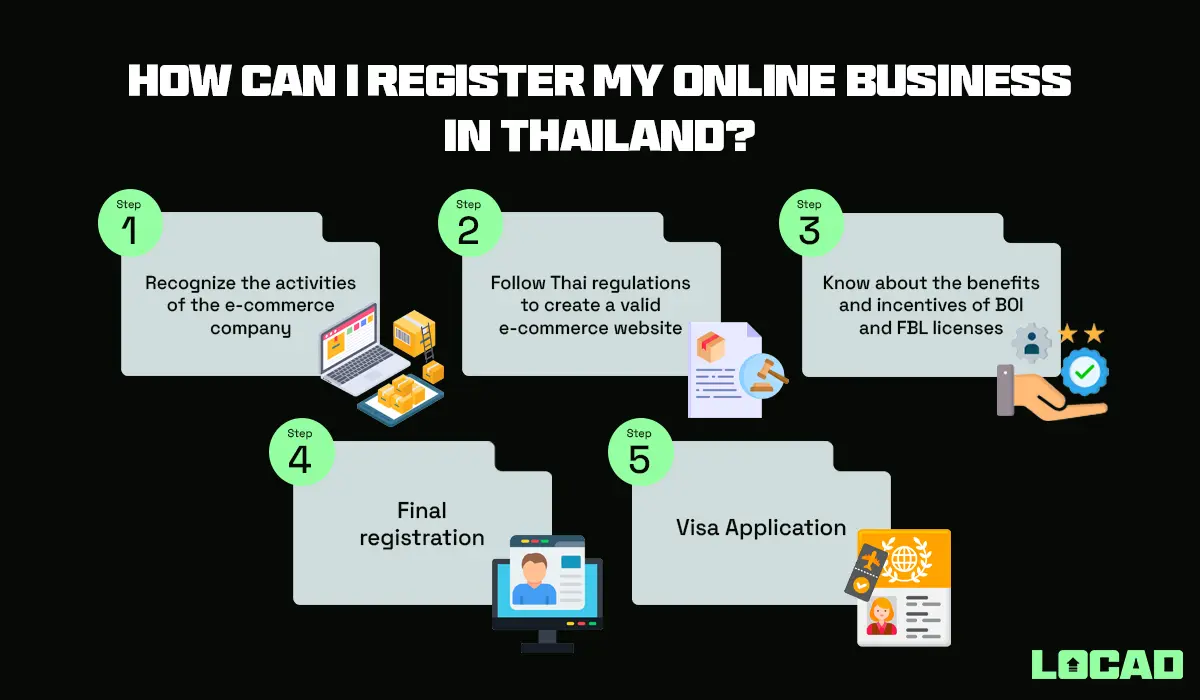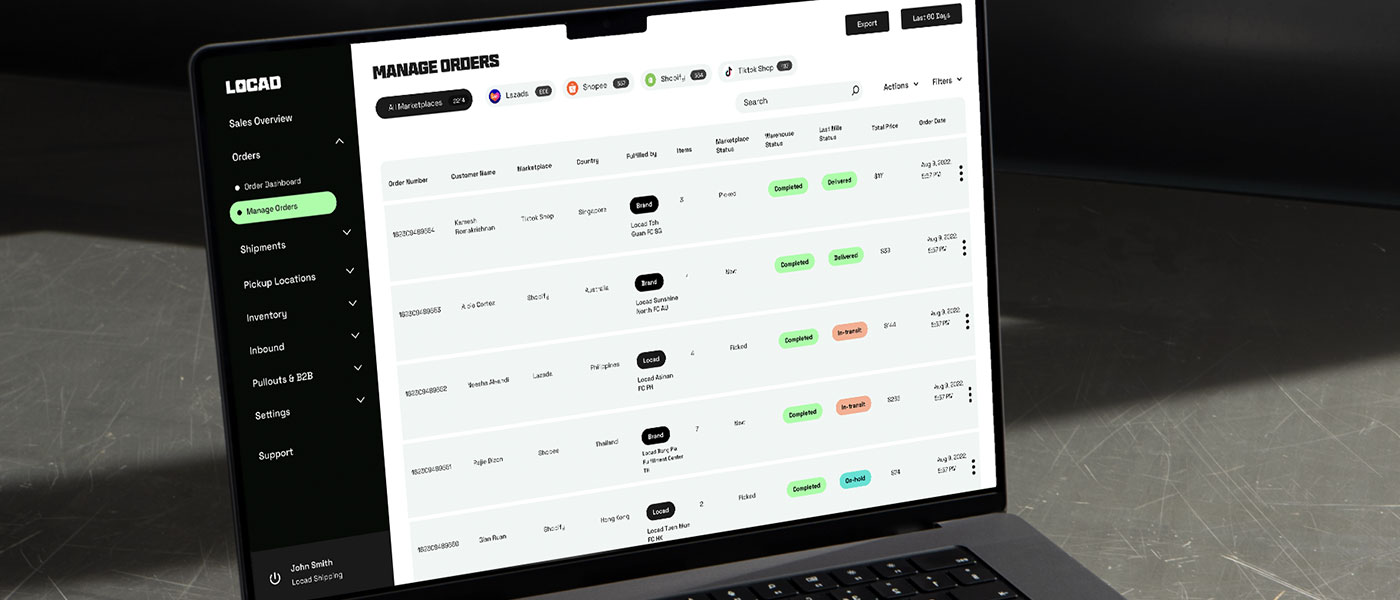After COVID-19 hit, the entire mechanism of business underwent a change worldwide. Today, people are more dependent on e-commerce platforms than offline stores. Besides, the benefits that online e-commerce businesses have come up with eventually grabbed people’s attention.
If you wish to develop an e-commerce store to aid people without compromising their comfort, Thailand can be a suitable location. Being the 26th largest e-commerce hub, Thailand earned a revenue of almost US $8.5 billion in 2021. By the end of 2022, you can expect this revenue growth rate to increase by more than 13%. So, hit the iron while it’s hot – invest in e-commerce in Thailand.
What is an e-commerce business license?
An e-commerce business license is an official document issued by the relevant government authorities that grants permission to operate an online business within a specific jurisdiction. In Thailand, this license serves as proof that your e-commerce business complies with local laws and regulations, ensuring consumer protection, fair business practices, and tax compliance.
Why is an E-commerce Business License Important?
Obtaining an e-commerce business license is crucial for several reasons:

- Legitimacy and Trust: Having a license adds credibility to your e-commerce business. It assures customers that you are a legitimate entity operating within the legal framework, fostering trust and confidence in your brand.
- Legal Compliance: An e-commerce business license ensures that you adhere to the laws and regulations governing e-commerce activities in Thailand. This helps you avoid penalties, fines, or even the risk of closure due to non-compliance.
- Consumer Protection: Obtaining a license demonstrates your commitment to consumer protection. It assures customers that you are accountable for the quality of products or services offered, providing them with a sense of security when engaging in online transactions.
- Access to Payment Gateways: Many payment gateways and financial institutions require a valid e-commerce business license to establish partnerships. Having a license enables you to offer a wider range of payment options to your customers, enhancing their shopping experience.
What Are The Legal Requirements For Starting An Online Business In Thailand?
Now, Thailand recognizes e-commerce businesses and considers them legally valid. The entire sector of e-commerce in Thailand is protected under the ETA or the Electronic Transaction Act. According to the Electronic Transaction Act, one can use electronic technology to conduct an online business that provides both products and services via electronic transactions.
How To Use Shopee Live Selling To Maximize Sales
Shopee Live, a livestream marketing feature, has become a game-changer, revolutionizing how e-commerce sellers connect with their audience. This interactive…
If you have an e-commerce business in Thailand with one or more websites selling the products or services, you must apply for an e-commerce license. Here is what you need to know about the e-license:
- You have to apply for an e-license within 30 days from the commencement of the business.
- During the proceedings, fill in the payment and pricing requirements.
Since the e-commerce business runs on an online platform, you have to create a website. There are specific considerations on the name of the website as discussed here:
- The website name should resonate with the services of the products it caters to.
- Application for an e-license should be made within 30 days from the commencement of the website.
- You have to choose a valid method of payment.
- You must submit the domain name registration document along with the application.
- Organizations responsibly taking charge of credit card transactions should be compliant with the requirements of the Bank of Thailand.
Next, look out for registration under the consumer protection board’s Office (OCPB) office. This safeguards the consumer’s rights as it considers your e-commerce company as a registered one, fit for direct sales. However, you have to notify the OCPB if these two conditions occur:
- If there are more than 3000 money transfers in a year.
- If there are 400 money transfers in a year, that yields 2 million.
Experience fulfillment by Locad today!
What Are The E-commerce Laws And Regulations In Thailand?
To allow online businesses’ seamless functioning and growth in Thailand, the Thai government and its ministries have devised some laws. The purpose of these laws and regulations for e-commerce in Thailand is:
- To develop a financial, political, and social interest in the country
- To formulate fair competition in the market
- To facilitate the involvement of private sectors in trade and commerce of the country
- To attract foreign investors with lucrative business incentives
For steady and smooth e-commerce operations in Thailand, the government has devised two laws directly related to the electronic commerce sector. They are as follows:
- The Electronic Transaction Act of B.E. 2544
The purpose of this Act is to legally recognize electronic transactions and consider the electronic e-commerce platform reliable. Further, this Act treats data messages as an original document of the transaction made. It recognizes electronic signatures and methods of receipt and dispatch of data.
- The Computer Crime Act of B.E. 2550
The reason behind formulating this Act is to promote strict prevention and suppression of computer-related offenses. It includes three different types of offenses – offenses related to computer data, computer systems, and the tools used for committing computer crimes. Further, the Act also inflicts liabilities and obligations on internet service providers.
Other legal provisions indirectly related to the electronic commerce industry of Thailand include The Penal Code, Data Protection Laws, and Consumer Protection Laws.
How Can I Register My Online Business In Thailand?
To register for an e-commerce company in Thailand, here are the steps that you need to follow:

Step 1: Recognize the activities of the e-commerce company
The sale of different products requires different licenses. Not obtaining these licenses can ban your e-commerce company from the market. Therefore, it is suggested to catch hold of an efficient law firm to get the best advice in this respect. Generally, e-commerce activity can be categorized into dropshipping and marketplace. Although both are tripartite models, the registration procedure differs.
Step 2: Follow Thai regulations to create a valid e-commerce website
For the website’s domain name registration, consult with the THNIC or Thai Network Information Center. To get the ‘.co.th’ extension, these are the documents that the owner needs to be ready with:
- Certificate of registration
- VAT registration document
- VAT modifications application document
Although trademark registration is not mandatory in e-commerce Thailand, it does make the company authentic. Trademarks legally safeguard the company against infringement. In case you are registering your company for a trademark, you need to submit a logo with the exact design and color, a notarized power of attorney, and a copy of your passport notarized by an authorized director.
Step 3: Know about the benefits and incentives of BOI and FBL licenses
As per the company law of Thailand, every company must have a Thai shareholder with 51% shares of him or those shareholders mentioned in the Foreign Business Act of 1982. However, a foreigner can also establish an e-commerce business in Thailand with the BOI company license. This BOI company license allows you to enjoy complete ownership of the company and tax and non-tax advantages.
Step 4: Final registration
You must register your company in front of the Business Development Department of Thailand. Once the director completes the statutory meeting, you get three months to register your company. Exceeding this deadline will nullify the statutory meeting. These are the elements to take care of when creating the company:
- Appointment of at least one director
- Determination of the company’s capital share
- Presence of company offices in Thailand
- Presence of at least three shareholders to create a limited liability company
How To Choose The Best 3PL For Thailand
3PLs are the backbone behind every thriving e-commerce in Thailand. Read on to know how to find the best to…
Step 5: Visa application
If you are a foreigner and want to open an e-commerce business in Thailand, you must receive a one-year business visa. To do this, apply for a non-immigrant visa before stepping into Thailand. Also, you must get a work permit before your business starts functioning there. On the 1st Feb 2018, the SMART visa came into vogue to encourage efficient foreigners to come to Thailand for investment or work purposes.
Where To Get A Business License?
For the Foreign Business License or the FBL, foreign business owners, shareholders, and investors should apply at the Foreign Licensing Department under the Ministry of Commerce in Thailand. Before that, you must check if your company has a capital of 2 million THB to get the license. However, you will obtain the FBL sooner, if you have already obtained approval from BOI.
What Do You Need To Obtain A Business License?
For license registration, these are the documents that you have to submit to the Department of Business Development:
- E-commerce registration application
- Passport or ID card of the applicant
- Power of attorney copies with original
- A clarification letter if you are late for registration
What are the Taxes Involved in Establishing an E-commerce Business in Thailand?
If you establish an e-commerce business in Thailand, you will surely want to expand and create a broader customer base. To help you optimize your payment gateways, we have listed all the taxes levied on e-commerce businesses in Thailand:

- In Thailand, there is a zero percent Value Added Tax or VAT rate for the export and import of services and goods.
- According to the e-business tax legislation of Thailand, every foreign e-commerce business operator has to pay 7% VAT to the revenue department of Thailand.
- If your online business yields more than THB 1.8 million in annual sales, you must pay 7% VAT.
How To Sell Online In Thailand?
Selling products and services online is very different from selling offline. First and foremost, you have to understand consumer behavior. This consumer behavior does include not only the products or services consumers are interested in but also their digital behavior. After all, you are planning to launch an e-commerce business in Thailand. It’s wise to learn about Thailand’s demography, how they spend time online, and their communication tools.
Next, focus on the consumers’ attitude towards e-commerce in Thailand. When it comes to shopping online, the rate at which Thai consumers update their passwords and have faith in OTPs. Therefore, to establish a robust e-commerce business in Thailand, you must be mindful of consumer safety.
Similar to conventional businesses, you must develop an effective e-commerce strategy for your firm. Further, identifying the apt sales channel is crucial. The digital marketing strategy that you design should generate consumer demand. Some potential ways to engage consumers are email marketing, content marketing, social media marketing, and search engine marketing.
The success of your e-commerce business in Thailand lies in the efficient and timely delivery of packages. Providing a free delivery option is sure to make Thai consumers love your brand.
Conclusion
Thailand is undoubtedly a convenient location for e-commerce businesses, provided you undergo all the legal processes mentioned in this article. Moreover, submitting legal documents during the formation of the e-commerce company will keep you away from any legal tussle that can occur later. Nevertheless, if you do encounter any trouble, do not hesitate to get help from a reputed and professional local law firm.
Furthermore, once you have the e-commerce business set up, you will have to take a look at many aspects of running a business. But you can always leave the logistics up to experts at a 3PL provider such as Locad. This way, not only will you not have to focus on the things that may be difficult for you to handle, but also dedicate that time to business growth strategies!
So, go on and sign up with Locad today!
What is the transaction fee for a Shopee seller?
Shopee charges sellers a 2.24% transaction fee for every successful transaction using Shopee’s payment services.
Does the shipping fee go to the seller?
No, the shipping fee does not go to the seller. The shipping fee is paid to the logistics partner that delivers the product to the buyer.
Who pays for shipping on Shopee?
The buyer pays for shipping on Shopee. The seller sets the shipping fee for their products, and the buyer is charged this fee when they checkout.
What is the cheapest way to ship?
The cheapest way to ship on Shopee depends on the product’s weight and dimensions. Standard shipping is usually the cheapest option for small and lightweight products, while non-weight-based shipping may be more economical for bulky or lightweight products.













